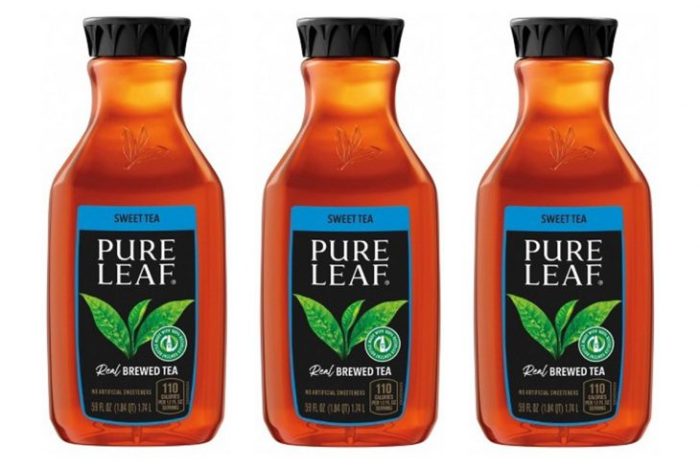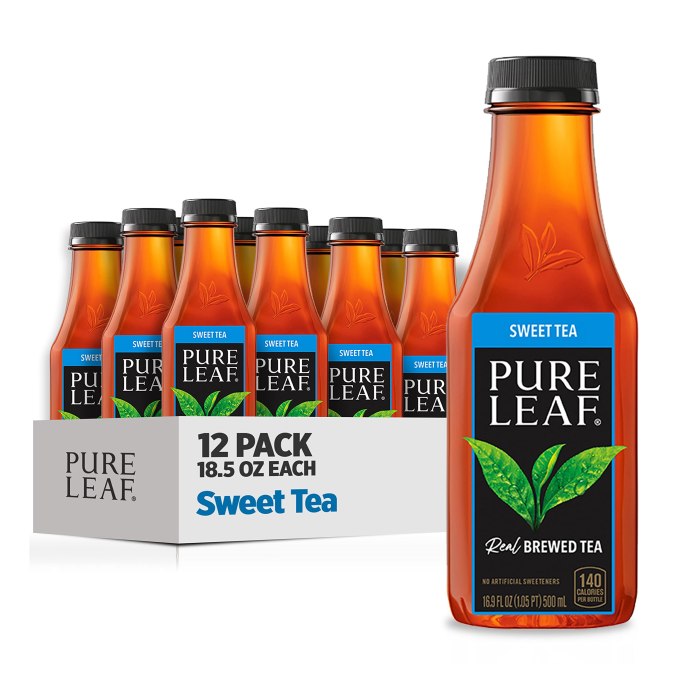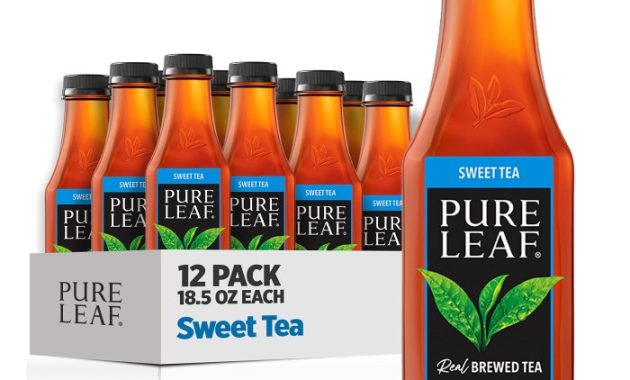McDonald’s Sweet Tea

Mcdonald’s sweet tea nutrition facts – Yo, fam! Let’s get down to the nitty-gritty of that McDonald’s sweet tea – the stuff that keeps us going ’til the next level up. We’re breaking it down, no cap.
McDonald’s sweet tea, a popular beverage, contains a significant amount of sugar, impacting its overall nutritional profile. A comparative analysis of its nutritional content could benefit from examining similar offerings at other establishments; for instance, understanding the nutritional information available for cracker barrel nutrition facts can provide context for assessing the relative healthiness of various fast-food and casual dining options.
Ultimately, a comprehensive understanding of McDonald’s sweet tea nutrition necessitates considering such comparisons.
McDonald’s Sweet Tea: Ingredient Breakdown
Right, so here’s the lowdown on what’s actually in that sweet nectar. This ain’t no guesswork, we’re talking about the typical ingredients, but remember, things can vary slightly depending on location and supplier. This table gives you the general picture.
| Ingredient | Quantity (Approximate) | Purpose | Potential Health Impact |
|---|---|---|---|
| Water | Majority | Base of the drink | Essential for hydration; no significant negative impact in moderation. |
| Black Tea Extract | Variable | Provides flavour and colour | Antioxidants; potential benefits depending on concentration. |
| High Fructose Corn Syrup | Significant | Sweetener | High in sugar, linked to weight gain and other health issues if consumed excessively. |
| Sugar | Variable | Sweetener | High in sugar, similar impacts to high fructose corn syrup. |
| Citric Acid | Small | Acidity regulator, enhances flavour | Generally safe, but excessive intake can affect tooth enamel. |
| Natural Flavours | Small | Enhances flavour profile | Varied; generally considered safe, but specific components not always disclosed. |
| Preservatives (e.g., Potassium Sorbate) | Small | Extends shelf life | Generally considered safe at low concentrations, but some individuals may have sensitivities. |
The tea leaves used are typically black tea, sourced from various regions depending on McDonald’s suppliers. The exact sourcing isn’t always publicly available, but it’s safe to say they’re aiming for a consistent, mass-produced flavour profile.
Visual Representation of Ingredient Proportions
Imagine a pie chart. The biggest slice, a vibrant blue, represents the water – easily the dominant component. Next, a large orange slice, almost as big as the blue, shows the combined sugars (high fructose corn syrup and sugar). A small, dark brown segment represents the black tea extract, giving it that classic colour. Then you’ve got tiny slivers: a pale yellow for citric acid, a light green for natural flavours, and a barely-there grey for preservatives.
This visual quickly shows the tea’s sugary nature.
Nutritional Content Analysis: Mcdonald’s Sweet Tea Nutrition Facts

Right, so we’re diving deep into the nutritional breakdown of McDonald’s sweet tea, innit? We’re talking calories, carbs, sugars – the whole shebang. Understanding this is key to making informed choices about what you’re putting in your body, especially if you’re tryna hit those fitness goals or just generally eat healthier.
Macronutrient Content of McDonald’s Sweet Tea
Yo, check this table out. It breaks down the macronutrients in both small and large servings of McDonald’s sweet tea. Remember, these figures are approximate and can vary slightly depending on location and preparation.
| Serving Size | Calories | Carbohydrates (g) | Sugars (g) |
|---|---|---|---|
| Small | 100-150 (approx.) | 25-35 (approx.) | 25-30 (approx.) |
| Large | 200-300 (approx.) | 50-70 (approx.) | 50-60 (approx.) |
The numbers above are estimates based on various online sources and may not reflect the exact nutritional values at all McDonald’s locations. Always check the nutritional information available at your local McDonald’s for the most accurate details.The high sugar content is a major consideration. Too much added sugar is linked to weight gain, type 2 diabetes, and heart disease.
The carb count is also significant; while carbs provide energy, excessive intake can lead to similar health issues if not balanced with a healthy diet and lifestyle. Protein is practically non-existent in sweet tea, which is expected.
Micronutrient Content of McDonald’s Sweet Tea
Let’s be real, sweet tea ain’t exactly a powerhouse of vitamins and minerals. It’s primarily water, sugar, and tea flavourings. While the tea itself might contain trace amounts of antioxidants (depending on the type of tea used), these are likely minimal in the processed McDonald’s version. Don’t expect to get your daily dose of vitamins from this brew.
It’s more of a treat than a nutritional supplement. You’re better off getting your vitamins and minerals from fruits, vegetables, and other nutrient-rich foods.
Health Implications and Considerations
Yo, fam, let’s get real about that McDonald’s sweet tea. It’s got that sweet, refreshing vibe, but regular sipping could throw your health a curveball. We’re talking potential issues from your waistline to your chompers. Let’s break it down.The high sugar content in McDonald’s sweet tea is the main player here. We’re not just talking about a little extra sweetness; it’s a serious dose of added sugar, which is linked to a whole load of health problems.
Think weight gain, blood sugar spikes, and even dental decay. It’s a sneaky culprit that can creep up on you if you’re not careful.
Weight Management
Excessive sugar intake contributes significantly to weight gain. Those empty calories from added sugar don’t provide much in the way of nutrients, but they sure do pack on the pounds. Regular consumption of sugary drinks like McDonald’s sweet tea can easily lead to a calorie surplus, resulting in weight gain and an increased risk of obesity. Imagine downing a large sweet tea every day – that’s a hefty amount of extra calories that your body has to deal with.
It’s like adding extra fuel to a car without ever using it to go anywhere, leading to build up.
Blood Sugar Control
The rapid increase in blood sugar levels after consuming sugary drinks can be particularly problematic for individuals with diabetes or those at risk of developing it. The body struggles to process the sudden influx of sugar, leading to insulin resistance and potentially contributing to type 2 diabetes. This isn’t just a concern for people already diagnosed; it’s a risk factor for anyone who regularly consumes high-sugar beverages.
Think of it like overloading your system – it can’t keep up.
Dental Health
Sugar feeds the bacteria in your mouth, leading to tooth decay and cavities. The acidic nature of sweet tea further erodes tooth enamel, increasing the risk of dental problems. Regular consumption without proper oral hygiene is a recipe for disaster for your pearly whites. Imagine the dentist bill; that ain’t cheap.
Recommendations for Moderate Consumption or Healthier Alternatives
Instead of guzzling down that sweet tea daily, consider limiting your intake or swapping it out for healthier options. Unsweetened iced tea, water infused with fruit, or even sparkling water with a squeeze of lemon are all great alternatives. Portion control is key; if you do choose to indulge, stick to a smaller size and maybe share with a mate.
Remember, moderation is your friend. Small changes can make a big difference in the long run.
Comparison with Other Beverages
Yo, let’s get real about that McDonald’s sweet tea and how it stacks up against other drinks you might grab. We’re breaking down the sugar rush, the calorie count, and the overall vibe of different beverages to help you make some smarter choices. Think of it as your cheat sheet to navigating the drinks aisle.
It’s all about understanding what you’re putting in your body. We’re not here to preach, just to give you the lowdown on the nutritional differences between various popular drinks, so you can make informed decisions. Knowing the facts is the first step to making healthier choices, bruv.
Nutritional Comparison of Beverages
| Beverage | Calories (approx.) | Sugar Content (approx. grams) | Other Notable Ingredients |
|---|---|---|---|
| McDonald’s Sweet Tea (Medium) | 200 | 50 | High fructose corn syrup, artificial sweeteners (depending on location) |
| Coca-Cola (Medium) | 200-250 | 65 | High fructose corn syrup, caramel color, phosphoric acid |
| Orange Juice (1 cup) | 110-120 | 20-25 | Naturally occurring sugars, Vitamin C |
| Unsweetened Iced Tea (Medium) | 0-10 | 0-1 | Water, tea leaves |
The table above shows a general comparison and values may vary slightly depending on serving size and specific brand. Always check the nutrition label for the most accurate information.
Calorie and Sugar Content Differences
As you can see, the calorie and sugar content varies wildly between these drinks. McDonald’s sweet tea and soda are high in both calories and sugar, largely due to the added sugar. Orange juice, while containing natural sugars, has a lower calorie count than the sugary drinks. Unsweetened iced tea is the clear winner, boasting minimal calories and sugar.
The difference is stark, innit?
Health Implications and Considerations, Mcdonald’s sweet tea nutrition facts
Regular consumption of high-sugar drinks like McDonald’s sweet tea and soda is linked to weight gain, type 2 diabetes, and other health problems. While orange juice offers some nutritional benefits, the sugar content should still be moderated. Unsweetened tea, on the other hand, is a refreshing and generally healthy option. The choice is yours, but knowing the facts can help you make better decisions for your body.
Answers to Common Questions
Does McDonald’s sweet tea contain artificial sweeteners?
This information is not consistently available publicly and may vary by location and time. Contacting McDonald’s directly or checking their website for location-specific information is recommended.
Is McDonald’s sweet tea suitable for diabetics?
Due to its high sugar content, McDonald’s sweet tea is generally not recommended for individuals with diabetes. Consult a physician or registered dietitian for personalized dietary advice.
What are the serving sizes available for McDonald’s sweet tea?
McDonald’s typically offers small, medium, and large sizes. Exact serving sizes may vary by location.
Are there any caffeine-free options for McDonald’s sweet tea?
This information is not consistently available publicly and may vary by location. Contacting McDonald’s directly or checking their website for location-specific information is recommended.

